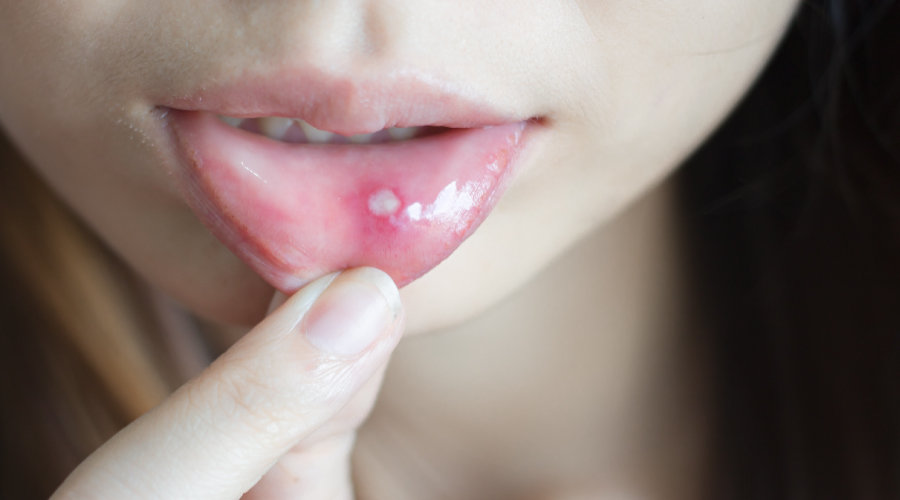

Mouth sores are painful lesions or ulcers on the soft oral tissues such as lips, inner cheeks or tongue. Mouth sores usually have a red rim with a white centre. Sores inside the mouth can be extremely painful and cause discomfort during eating, drinking and brushing your teeth. Mouth sores are usually harmless and resolve by themselves in a few weeks. This blog will subsequently cover the causes and treatment for mouth sores.
Causes of Mouth Sores
Mouth sores can be triggered by several factors. The following list explains the significant mouth sores causes in detail:
1. Injury: Minor injury or abrasion of the oral tissue can cause mouth sores to develop. Mouth sores can also be caused by biting your cheek, tongue, or lip.
2. Allergy: Mouth sores can also develop as a reaction to allergies caused by over-the-counter medications, toothpaste and mouthwash.
3. Viral Infections: Viral infections caused by the herpes simplex virus cause mouth ulcers known as cold sores. Mouth sores are also caused by hand, foot and mouth disease.
4. Bacterial Infections: Infections caused by bacteria such as streptococcus can result in painful mouth sores.
5. Hormonal Changes: hormonal fluctuations in the body because of the menstrual cycle can also cause mouth ulcers.
6. Nutrient Deficiencies: Mouth sores can be caused to due to underlying deficiencies of essential nutrients such as vitamin B12, folate and iron.
7. Stress and Anxiety: Mouth ulcers can be triggered by extreme stress and anxiety.
8. Mouth Burn: Hot food and drinks can irritate the outer lining of the oral cavity which can also cause sores inside the mouth.
9. Autoimmune Conditions: Autoimmune Diseases such as lupus can cause mouth sores to develop easily.
10. Gastrointestinal Diseases: Celiac and Crohn’s disease can be the underlying causes of mouth sores.
Types of Mouth Sores
1. Canker Sores: Canker sores are oval-shaped, white sore in the mouth surrounded by a red lining. They are usually harmless and tend to go away on their own. Canker sores can be caused by a variety of factors such as injury, allergies or mouth burns. They are not contagious.
2. Cold Sore: Cold sores are painful red-coloured blisters. They appear near the lips and mouth. Cold sores are caused by herpes simplex type 1 virus, or HSV-1. Unlike canker sores, they are contagious. It can spread through kissing and sharing oral hygiene products.
3. Gingivostomatitis: Gingivostomatitis is an oral infection caused by viruses and bacteria. It causes several painful sores inside the mouth. Mouth sores cause include poor dental hygiene. It is contagious as it is caused by HSV-1 virus and streptococcus bacteria.
4. Oral Thrush: Oral thrush is white or yellow patches on the tongue and mouth. It is caused by a fungal infection. It’s most common in infants, children and adults with immune deficiency.
5. Herpangina: Herpangina is a viral infection that causes mouth sores at the back of the throat. It is most often seen in children and causes high fever.
Mouth Sore Remedies
Mouth sore treatments majorly depend upon the root causes of the ulcer. However, several treatment options can be used to relieve pain and heal sores on the mouth and tongue. Effective mouth sore treatments are mentioned below:
1. Over-the-counter Gels or Ointments
Antiseptic gels can be directly applied to the affected area. This can help in soothing pain and inflammation. Gels such as Orasore mouth ulcer gel and Orajel are examples of antiseptic gels.
2. Mouth Rinse
Saltwater rinses can effectively reduce the pain and stinging sensation of mouth sores. This treatment can easily be done at home by mixing one tablespoon of salt into a cup of warm water. Rinse your mouth with the solution by holding the liquid in your mouth to cover the affected area and then spit it out.
3. Good Oral Hygiene
Poor dental hygiene is one of the leading mouth sore causes. Taking adequate care of your oral hygiene by brushing, flossing and using mouthwashes regularly can help prevent mouth sores
4. Avoid Irritants
Mouth sores can be prevented by avoiding certain substances that can disturb the delicate lining of the mouth. Examples include hot food, tobacco, smoking, harsh toothpaste or mouthwashes.
Conclusion
Mouth sores are common and usually do not require any special treatment. They cause severe discomfort and cause difficulties in everyday activities such as eating and drinking. However, it is advised to see a doctor if they recur often, are extremely painful and occur with other symptoms such as fever.




